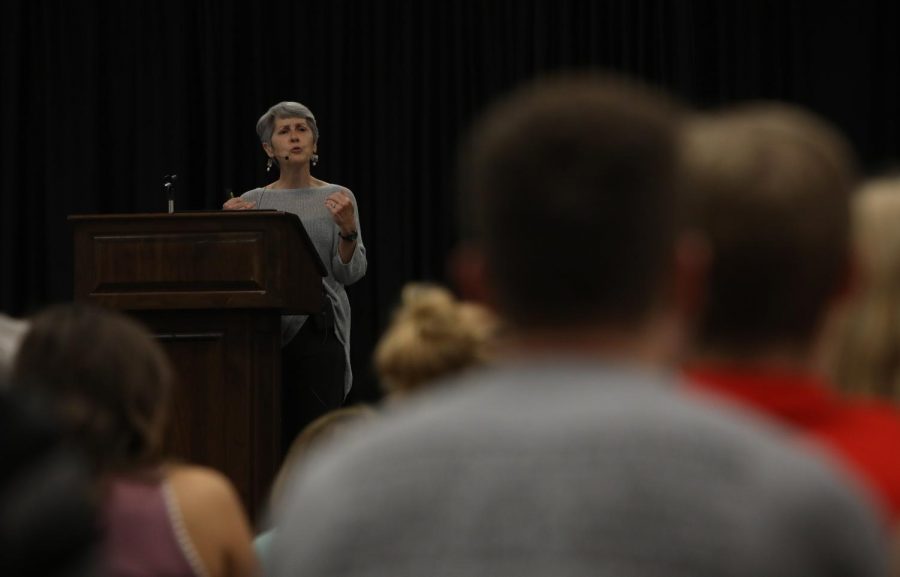Daughter shares father’s Holocaust experience
Holocaust remembrance lecture strikes a chord with audience
April 11, 2019
For Robert May, growing up in Camberg, Germany, was a quickly deteriorating nightmare.
May came from a family that was deeply entrenched in German culture. His relatives fought in World War I and the Franco-Prussian War. His father owned a small family business in the middle of their small town. He spent his boyhood days playing in his uncle’s hardware store and doing schoolwork with his trusty slate and pencil. Then, when May reached the third grade, his childhood abruptly stopped.
May’s daughter, Ann Mollengarden, has dedicated her life to educating others on how and why her father’s childhood came to an end. Mollengarden, who serves as the education coordinator at the Birmingham Holocaust Education Center, has travelled internationally in an effort to learn all she can about Jews affected by the Holocaust.
Mollengarden has compiled her research into a 60-minute multimedia lecture, which she brought to Tuscaloosa on Tuesday evening. Her presentation, rich with historical detail and familial anecdotes, stirred the crowd at the Ferguson Center.
Jacob Silberman, a senior majoring in communication studies, attended the event with his friends and fellow members of Alpha Epsilon Pi, a Jewish fraternity on campus. For Silberman, it was the harrowing story of May’s aunts and uncles that stuck with him.
As Mollengarden explained, her father’s immediate family was able to escape Germany with help from their relatives in Milan and Holland. As Hitler’s power expanded, those relatives were forcibly removed from their homes and murdered in concentration camps.
“My great-grandfather came from Russia before the war, so I guess it was important for me to know this story,” Silberman said. “I guess I never accounted for the people who lost their lives helping others survive.”
Though May’s aunts and uncles perished, he, his brothers and his parents made it safely to New Orleans, where they began to start over. May became a doctor who enlisted in the U.S. Army, where he climbed up the ranks of an army in need of medical professionals and quickly became the chief of OB-GYN at the Fort Walton Beach base in Florida.
As Mollengarden introduced the audience to her cast of family members who were integral to her father’s story, she often displayed their stolpersteine, stumbling stones placed in recognition of those lost to the Holocaust. This memorialization, among other dedicated sites that Mollengarden described, led law school student Danielle Kerm to draw parallels to memorials in the South.
“The extent to which this disaster has been memorialized in Germany, the importance of retaining that memory and recognizing that legacy in the present day is very important, I think,” Kerm said. “That really resonated with me because it is something that is absolutely critical. To come to terms with events as destructive and reprehensible as the Holocaust, I think that memory has to be consistently maintained.”
The South’s disaster, Kerm said, is the brutal history of slavery and its repercussions. The installation of a monument to lynching victims in Montgomery is a first step in recognizing the victims of Alabama’s past.
“There were serious violations of civil rights and human rights in the form of slavery and the civil rights movement,” Kerm said. “I don’t think that we have adequately addressed that legacy.”
Kerm brought up her concerns during Mollengarden’s Q&A session, where Mollengarden was also asked about the persistence of scapegoating, life as a second-generation Holocaust survivor and the United States’ current political climate.
Though Mollengarden noted that her father is “frightened” by the similarities between the state of the U.S. and the rise of Nazism in Germany, she remains optimistic about the American future. Citing the differences in the countries’ constitutions, Mollengarden said she believes that the checks and balances of the U.S. government will continue to keep citizens safe. Her optimism, Mollengarden said, is hard to shake.
“I’m not going to be the family that picks up and goes in a heartbeat. I’ll be the family who sticks around and says, ‘It’s going to get better,’” Mollengarden said. “I’m generally an optimistic person, but that may be dangerous.”
One of Mollengarden’s final lessons for the audience was about passivity during times of political strife. Step one, Mollengarden later explained, is staying aware. In the days of instant news notifications and endless current events coverage, being unaware is simply inexcusable, Mollengarden said. The next step is straightforward: Do something.
“You need to look at what can happen and say, ‘Do I want to be part of a change, to make this not happen, or am I going to be content to see what happens?’” Mollengarden said. “If you want to be part of the change, you have to, have to be part of the change.”








